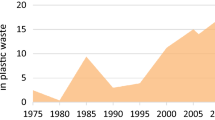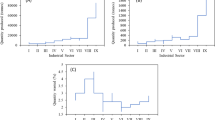Abstract
This study explores the factors influencing household solid waste source separation intention and household solid waste disposal in three districts of Sri Lanka’s Western Province. The study utilizes data from 428 households and employs ordinal probit regression and multinomial logistic regression models to analyze the data. The results indicate that the age of the household head, land size, length of time living in the current residence, knowledge of waste management, inconvenience, attitudes, and subjective norms significantly influence household solid waste source separation intention. On the other hand, house size, land size, family size, type of settlement, ownership of the current residence, education level of the household head, place of the food item purchase, experience, inconvenience, awareness campaigns by the local authority, and general awareness significantly affect household solid waste disposal. The findings suggest that practical and cost-effective education and communication campaigns are essential to promote sustainable household waste management practices in Sri Lanka. These campaigns, however, should be tailored to the unique characteristics of each settlement to maximize their effectiveness.



Similar content being viewed by others
References
Abdel-Shafy HI, Mansour MS (2018) Solid waste issue: sources, composition, disposal, recycling, and valorization. Egypt J Pet 27(4):1275–1290
Ma J et al (2018) An analysis of influencing factors on municipal solid waste source-separated collection behavior in Guilin, China by using the theory of planned behavior. Sustain Cities Soc 37:336–343
Kumara AS, Pallegedara A (2020) Household waste disposal mechanisms in Sri Lanka: nation-wide survey evidence for their trends and determinants. Waste Manage 114:62–71
Mattar L et al (2018) Attitudes and behaviors shaping household food waste generation: lessons from Lebanon. J Clean Prod 198:1219–1223
Oduro-Appiah K, Afful A, Osei-Tutu H (2022) Assessment of belief constructs to support an intervention in municipal solid waste separation at the source in low–middle-income countries: observations from the Greater Accra Region of Ghana. Recycling 7(2):17
Alhassan H, Kwakwa PA, Owusu-Sekyere E (2020) Households’ source separation behaviour and solid waste disposal options in Ghana’s Millennium City. J Environ Manage 259:110055
Pakpour AH et al (2014) Household waste behaviours among a community sample in Iran: An application of the theory of planned behaviour. Waste Manage 34(6):980–986
Zhang D et al (2015) Residents’ waste separation behaviors at the source: using SEM with the theory of planned behavior in Guangzhou, China. Int J Environ Res Public Health 12(8):9475–9491
Fernando RLS (2019) Solid waste management of local governments in the Western Province of Sri Lanka: an implementation analysis. Waste Manage 84:194–203
Karunarathna A, Rajapaksha T, Gamagedara Y (2021) Challenges and opportunities of source-segregated waste collection in Sri Lanka. https://www.iges.or.jp/en/pub/waste-separation-sri-lanka/en. Accessed 28 Jan 2024
Parliament of Sri Lanka (2017) Sustainable Development Act, 2017. https://www.srilankalaw.lk/YearWisePdf/2017/19-2017_E.pdf
Ministry of Environment-Sri Lanka (2020) National policy on waste management. http://www.env.gov.lk/web/images/pdf/policies/National_Policy_on_Waste_Management_English.pdf. Accessed 25 Nov 2022
Ministry of Environment of Sri Lanka (2021) National Action Plan on plastic waste management 2021–2030. http://envmin.nsf.gov.lk/bitstream/handle/1/560/ENV_0102.pdf?sequence=2&isAllowed=y
Ghani W et al (2013) An application of the theory of planned behaviour to study the influencing factors of participation in source separation of food waste. Waste Manage 33(5):1276–1281
Alhassan H et al (2018) Application of theory of planned behaviour to households’ source separation behaviour in Ghana. Manage Environ Qual 29(4):704–721
Padilla AJ, Trujillo JC (2018) Waste disposal and households’ heterogeneity. Identifying factors shaping attitudes towards source-separated recycling in Bogotá, Colombia. Waste Manage 74:16–33
Loan LTT et al (2017) Psychological driving forces behind households’ behaviors toward municipal organic waste separation at source in Vietnam: a structural equation modeling approach. J Mater Cycles Waste Manage 19(3):1052–1060
Sarbassov Y et al (2019) Survey on household solid waste sorting at source in developing economies: a case study of Nur-Sultan City in Kazakhstan. Sustainability 11(22):6496
ColomboPage (2022) UNDP holds workshop for scaling up sustainable and low-carbon Municipal Solid Waste Management in Sri Lanka. http://www.colombopage.com/archive_22B/Nov10_1668094294CH.php. Accessed 10 Dec 2022
Department of Census and Statistics (2018) Household income and expenditure survey—2016. Ministry of National Policies and Economic Affairs Sri Lanka
Krejchie RV, Morgan DW (1970) Determining sample size for research activities. Educ Psychol Measur 30:607–610
Cohen J (1992) Statistical power analysis. Curr Dir Psychol Sci 1(3):98–101
Podsakoff PM et al (2003) Common method biases in behavioral research: a critical review of the literature and recommended remedies. J Appl Psychol 88(5):879
Hair JF, Page M, Brunsveld N (2019) Essentials of business research methods. Routledge, London
Jordan PJ, Troth AC (2020) Common method bias in applied settings: the dilemma of researching in organizations. Aust J Manag 45(1):3–14
MacKenzie SB, Podsakoff PM (2012) Common method bias in marketing: causes, mechanisms, and procedural remedies. J Retail 88(4):542–555
Greene WH (2003) Econometric analysis. Pearson Education India
Wooldridge JM (2002) Econometric analysis of cross section and panel data, vol 108. MIT Press, Cambridge, MA, pp 245–254
Hausman J, McFadden D (1984) Specification tests for the multinomial logit model. Econometrica 52(5):1219–1240
Bagozzi R, Yi Y (1988) On the evaluation of structural equation models. J Acad Market Sci 16:74–94
Field A (2009) Discovering statistics using SPSS. Sage, Thousand Oaks, CA
Kaiser HF (1974) An index of factorial simplicity. Psychometrika 39(1):31–36
Stoeva K, Alriksson S (2017) Influence of recycling programmes on waste separation behaviour. Waste Manage 68:732–741
Zhang Y et al (2022) What determines urban household intention and behavior of solid waste separation? A case study in China. Environ Impact Assess Rev 93:106728
Shen L et al (2019) Factors influencing young people’s intention toward municipal solid waste sorting. Int J Environ Res Public Health 16(10):1708
Wang Z, Dong X, Yin J (2018) Antecedents of urban residents’ separate collection intentions for household solid waste and their willingness to pay: evidence from China. J Clean Prod 173:256–264
Sivakumar K, Sugirtharan M (2010) Impact of family income and size on per capita solid waste generation: a case study in Manmunai North Divisional Secretariat Division of Batticaloa
Zhao Y, Diunugala HP, Mombeuil C (2021) Factors affecting household solid waste generation and management in Sri Lanka: an empirical study. Environ Monit Assess 193(12):1–22
Fadhullah W et al (2022) Household solid waste management practices and perceptions among residents in the East Coast of Malaysia. BMC Public Health 22(1):1–20
Lee S, Paik HS (2011) Korean household waste management and recycling behavior. Build Environ 46(5):1159–1166
Chikowore N (2021) Factors influencing household waste management practices in Zimbabwe. J Mater Cycles Waste Manage 23(1):386–393
Yoada RM, Chirawurah D, Adongo PB (2014) Domestic waste disposal practice and perceptions of private sector waste management in urban Accra. BMC Public Health 14(1):1–10
Chu X et al (2023) Comparative analysis on the performances of implementing compulsory and advocative policies in municipal solid waste classification. Environ Impact Assess Rev 99:106982
Padel S, Foster C (2005) Exploring the gap between attitudes and behaviour: understanding why consumers buy or do not buy organic food. Br Food J 107:606–625
Nittala R (2014) Green consumer behavior of the educated segment in India. J Int Consum Mark 26(2):138–152
Jayasinghe R, Azariadis M, Baillie C (2019) Waste, power, and hegemony: a critical analysis of the wastescape of Sri Lanka. J Environ Dev 28(2):173–195
Funding
This research did not receive any specific grant from funding agencies in the public, commercial, or not-for-profit sectors.
Author information
Authors and Affiliations
Corresponding authors
Additional information
Publisher's Note
Springer Nature remains neutral with regard to jurisdictional claims in published maps and institutional affiliations.
Rights and permissions
Springer Nature or its licensor (e.g. a society or other partner) holds exclusive rights to this article under a publishing agreement with the author(s) or other rightsholder(s); author self-archiving of the accepted manuscript version of this article is solely governed by the terms of such publishing agreement and applicable law.
About this article
Cite this article
Yuhuan, Z., Diunugala, H.P. & Mombeuil, C. Factors affecting household solid waste source separation intention and disposal: a focus on Sri Lanka. J Mater Cycles Waste Manag 26, 1776–1794 (2024). https://doi.org/10.1007/s10163-024-01936-4
Received:
Accepted:
Published:
Issue Date:
DOI: https://doi.org/10.1007/s10163-024-01936-4




